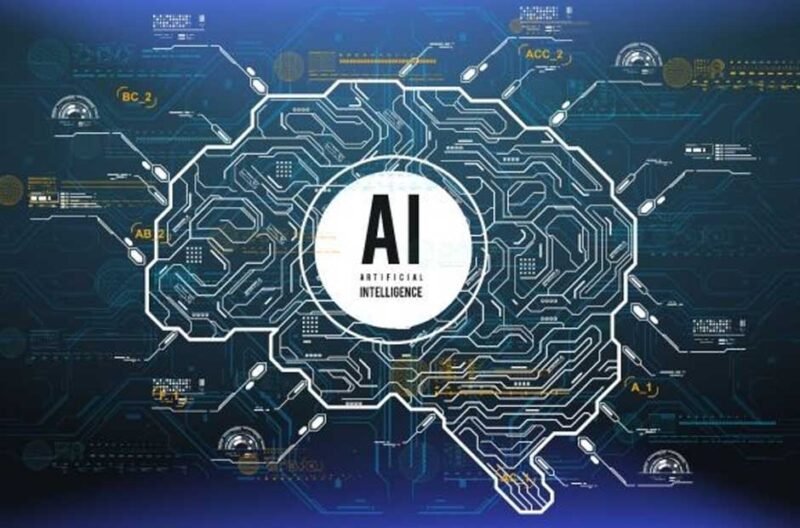
Artificial Intelligence (AI) has revolutionized various industries, driving innovation, efficiency, and competitiveness. From healthcare to finance, AI technologies transform traditional processes, unlock new opportunities, and address complex challenges. Let’s explore how AI is making significant strides in these six key industries:
1. Healthcare
AI is revolutionizing patient care, diagnosis, and treatment in the healthcare industry. Diagnostic tools powered by AI analyze medical images, including X-rays and MRI scans, with exceptional precision, facilitating early detection of diseases such as cancer and cardiovascular conditions. Moreover, AI-driven predictive analytics assist healthcare providers in identifying patients at risk of developing certain illnesses, enabling proactive interventions and personalized treatment plans. Natural language processing (NLP) algorithms also enhance patient-provider interactions through virtual assistants and chatbots, streamlining administrative tasks and improving accessibility to healthcare services.
2. Finance
AI is reshaping the financial sector by optimizing processes, enhancing decision-making, and mitigating risks. AI-driven algorithms analyze vast amounts of financial data in real time to detect patterns, identify market trends, and forecast investment opportunities. Robo-advisors leverage machine learning algorithms to offer investors personalized financial advice and portfolio management services, democratizing wealth management access. Furthermore, AI-powered fraud detection systems monitor transactions, detect suspicious activities, and prevent fraudulent transactions, safeguarding financial institutions and their customers from cyber threats and financial crimes.
3. Legal
In the legal sector, AI technologies are revolutionizing various aspects of legal practice, from document review to case prediction. AI-powered legal research platforms analyze vast amounts of case law, statutes, and legal documents to provide insights, precedents, and recommendations to legal professionals, enhancing efficiency and accuracy in legal research. Companies like TrialView have used AI to create frameworks for the numerous documents needed for court cases. Moreover, natural language processing (NLP) algorithms automate contract review processes, extracting key terms, clauses, and risks from legal documents, thereby streamlining due diligence and contract management tasks. Additionally, AI-driven predictive analytics assist lawyers in case outcome prediction, assessing litigation risks, and developing effective legal strategies, ultimately improving client representation and decision-making in legal matters.
4. Manufacturing
In manufacturing, AI technologies are driving automation, efficiency, and predictive maintenance. AI-powered predictive maintenance systems analyze equipment data to predict potential failures and schedule maintenance proactively, minimizing downtime and optimizing production processes. Robotics and autonomous systems equipped with AI algorithms streamline manufacturing operations, performing repetitive tasks with precision and speed. Furthermore, AI-enabled quality control systems inspect products in real time, identifying defects and ensuring adherence to quality standards, thereby enhancing product quality and reducing waste.
5. Retail
AI is transforming the retail industry by personalizing customer experiences, optimizing supply chain management, and driving sales. AI-powered recommendation engines analyze customer data, preferences, and purchase history to offer personalized product recommendations, enhancing customer engagement and loyalty. Furthermore, computer vision technology enables retailers to implement cashier-less checkout systems and automated inventory management solutions, improving operational efficiency and reducing costs. Additionally, AI-driven chatbots and virtual assistants provide personalized customer support, address inquiries, and facilitate seamless shopping experiences across various channels.
6. Transportation
In the transportation sector, AI is driving advancements in autonomous vehicles, traffic management, and logistics optimization. AI algorithms power self-driving vehicles to interpret traffic signals, navigate roads, and respond to dynamic environments autonomously. Moreover, AI-powered predictive analytics optimize route planning, fleet management, and cargo logistics, reducing fuel consumption, minimizing delivery times, and improving overall operational efficiency. Additionally, AI-driven traffic management systems analyze real-time traffic data to optimize traffic flow, alleviate congestion, and enhance road safety, thereby improving transportation infrastructure and urban mobility.
Conclusion
AI is revolutionizing various industries by driving innovation, efficiency, and competitiveness. From healthcare to transportation, AI detector and technologies are transforming traditional processes, unlocking new opportunities, and addressing complex challenges, paving the way for a smarter, more interconnected future.









